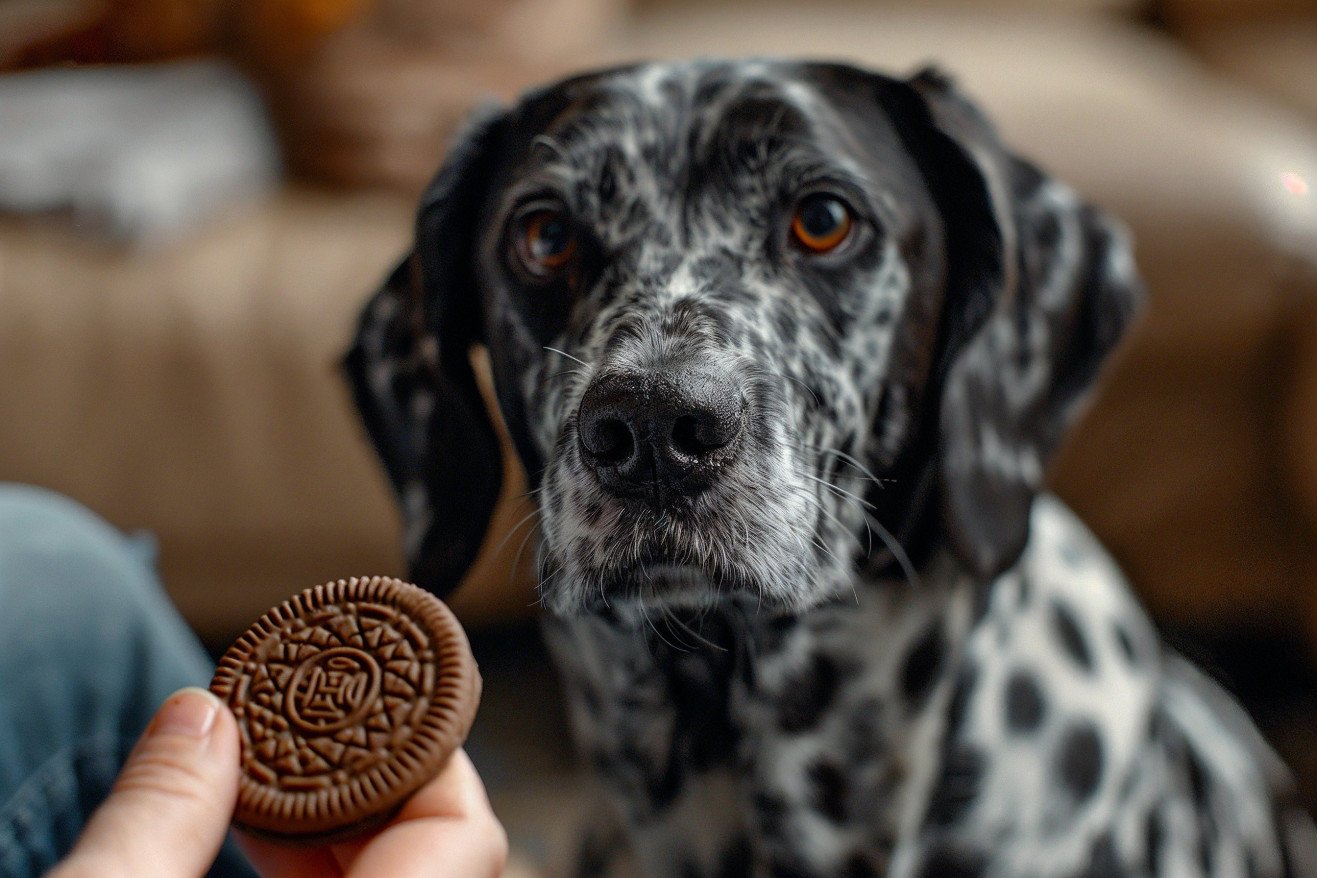Can Dogs Eat Oreos? The Risks of Sharing Your Cookies
16 February 2024 • Updated 16 February 2024

You may love those chocolate sandwich cookies, but can you share them with your dog? No, dogs can’t eat Oreos. Not only do Oreos contain chocolate, which is toxic to dogs, but they also have high sugar and fat content, which can cause issues like pancreatitis. If your dog has eaten Oreos, call your vet right away.
To help you better understand the risks that Oreos pose to dogs, we’ll look at the latest studies in veterinary science and animal nutrition. We’ll investigate the ingredients in Oreos that are bad for dogs, the impact of chocolate and other sweeteners on dogs, and the general dietary recommendations that help keep our pets safe.
Through this research, we hope to give you insight into why dogs can’t eat certain human foods and how to make sure the treats you give them are healthy and fun.
Can dogs eat Oreos?
Chocolate Toxicity in Oreos
While Oreos are a delicious snack for people, the chocolate in the cookies is toxic to dogs. Theobromine and caffeine, the two main toxic components in chocolate, are dangerous to dogs because their bodies can’t process them as quickly as humans, according to VCA Animal Hospitals. These chemicals are stimulants and can cause a number of problems when dogs eat them.
The Merck Veterinary Manual explains that the symptoms of chocolate poisoning in dogs can range from mild gastrointestinal problems, like vomiting and diarrhea, to more severe neurological symptoms, including tremors and seizures. Because dogs’ sensitivity to chocolate varies, even small amounts can cause symptoms, and the half-life of theobromine in dogs means that the symptoms can last for days.
Dogs that have eaten chocolate need to be taken to the vet immediately. Treatment can include inducing vomiting, giving activated charcoal, and providing supportive care, like IV fluids and medications, according to PetMD.
The severity of the poisoning depends on the type and amount of chocolate the dog has eaten, with darker chocolates being more dangerous because they contain more of the toxic substances. To protect your dog, it’s important to be aware of these dangers and make sure that your dog can’t access these types of snacks.
Sugar Overload: The Impact of High Sugar Content
The high sugar content in Oreos can lead to a number of health problems for dogs. While sugar isn’t toxic to dogs, the short-term effects of eating Oreos can include gastrointestinal upset, vomiting, diarrhea, and general discomfort, according to Bond Vet.
While these short-term effects are worrisome, the long-term effects of eating sugary snacks like Oreos are even more damaging to a dog’s health. Dogs who eat sugary snacks on a regular basis can experience weight gain, hormonal imbalances, and even develop diabetes.
In addition, Holiday Barn Pet Resorts points out that a diet high in sugar can also increase the risk of obesity and dental issues.
The source of the sugar is also important. While dogs can eat the natural sugars found in some fruits in moderation, the processed sugars in Oreos are different. The processed sugars in Oreos lead to a quick increase in blood sugar, while the sugars in whole grains and fruits are broken down more slowly in the body, according to Trupanion.
To control your dog’s sugar intake, make sure to stick to dog-safe fruits and vegetables and always use moderation. Keep a close eye on your dog’s diet and make sure to be diligent about keeping harmful sweets away from them. In doing so, you can help ensure that your dog doesn’t experience the health problems associated with a high sugar diet.
Artificial Sweeteners in Sweets
In addition to sugar and chocolate, there’s another reason to be concerned about giving your dog sweet treats like Oreos: artificial sweeteners. Xylitol, in particular, is a sweetener that’s often found in many “sugar-free” products and can be extremely dangerous for dogs. The FDA has warned about the dangers of xylitol, which can cause hypoglycemia and liver failure in dogs even in small amounts.
If a dog has ingested a sweetener like xylitol, symptoms can include vomiting, weakness, incoordination, collapse, and seizures. These symptoms are more likely to be immediate and more severe than those caused by sugar or chocolate.
To protect your dog, make sure to read the labels of any products you’re considering giving them to make sure they don’t contain xylitol, which can also be listed as wood sugar, birch sugar, or birch bark extract.
The American Kennel Club’s Chief Veterinary Officer, Dr. Jerry Klein, explains that other sweeteners like erythritol or stevia are probably less toxic but can still cause gastrointestinal upset in dogs if they’re ingested in large amounts.
You can help reduce the risk of artificial sweetener toxicity by being careful about the treats you give your dog and opting for natural, dog-friendly options instead. And always make sure that any human treats, especially those that are labeled as sugar-free, are stored where your dog can’t get to them.
A Dog’s Diet: Toxic Human Foods
When it comes to what we feed our furry friends, not all human foods are safe for dogs. In fact, some things that we eat every day can be toxic to our pets.
ASPCA warns against grapes and raisins, which can cause kidney failure in dogs, and macadamia nuts, which can cause weakness, vomiting, and hyperthermia. Meanwhile, onions, garlic, and chives, which are all part of the allium family, can cause gastrointestinal irritation and even lead to anemia in dogs, according to GoodRx.
It’s important for dog owners to know what to avoid. After all, dogs have different dietary needs than humans, and it’s important to make sure that they’re getting a balanced diet that meets their species’ needs. This is why it’s important to stick to dog food and avoid giving dogs any of the human foods that could be toxic.
If a dog does eat something toxic, it’s important to act fast. This means calling your vet or the ASPCA Animal Poison Control Center at (888) 426-4435. This way, you can get expert advice that could save your pet’s life, just like you can save your pet’s life by keeping toxic foods out of their reach. This way, you can make sure that your pet stays healthy and safe.
Key Takeaways: Keeping Your Dog Safe from Dangerous Foods
It is up to us as pet parents to keep our dogs safe and healthy. This includes being aware of what we’re feeding them, especially when it comes to human foods like Oreos. Oreos are especially dangerous to dogs because they contain chocolate, which is toxic, sugar, which can cause stomach upset, and can lead to long-term health problems like obesity and diabetes. Meanwhile, artificial sweeteners like xylitol can cause life-threatening issues.
Knowing these dangers makes it clear that it’s important to keep Oreos and other similar foods away from our dogs. By sticking to dog-friendly foods and treats, we can avoid unnecessary health problems. It’s important that we stay aware of what we’re feeding our dogs and make sure we’re keeping them safe and healthy. After all, it’s a sign of our love and commitment to our dogs.


